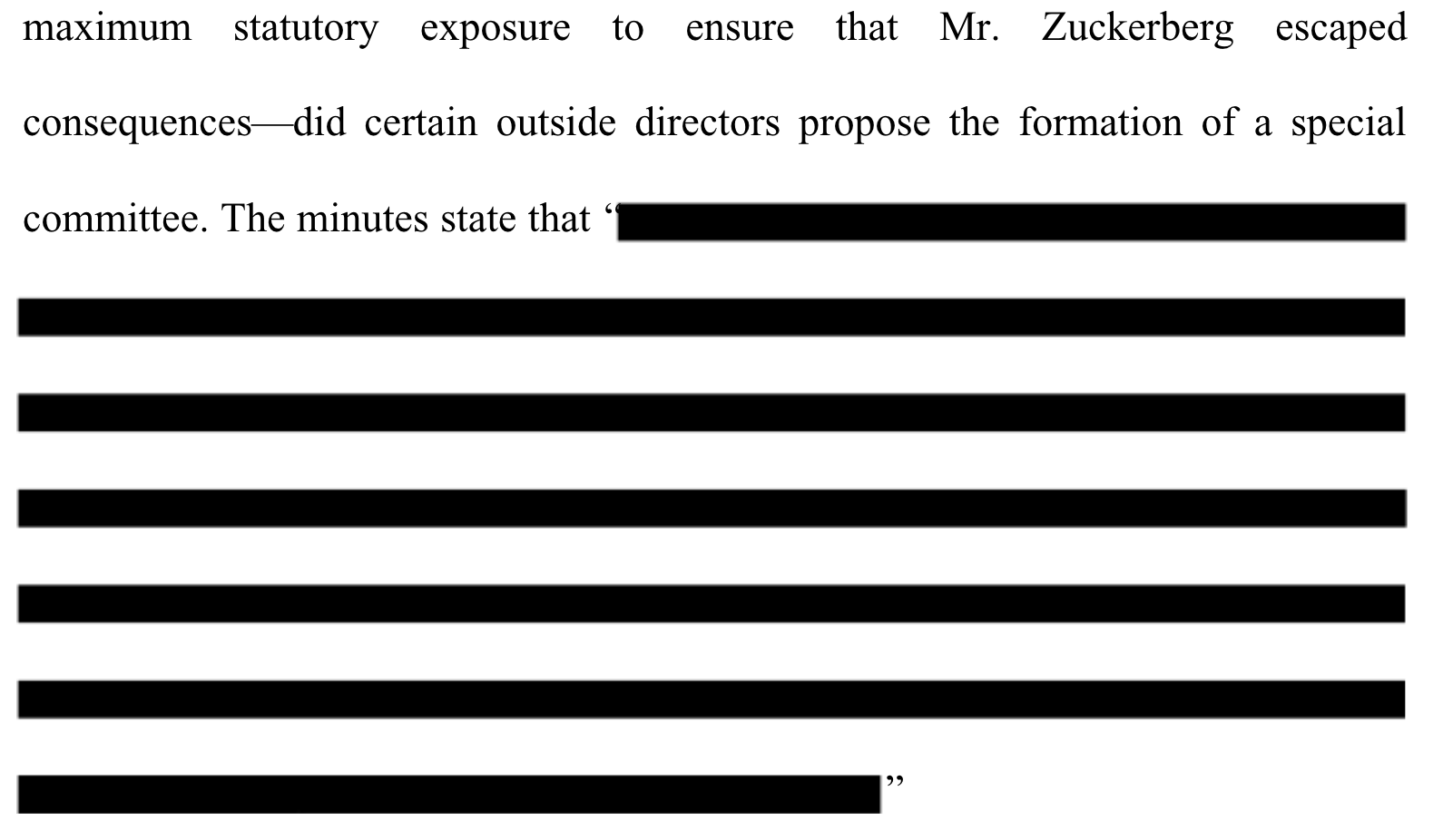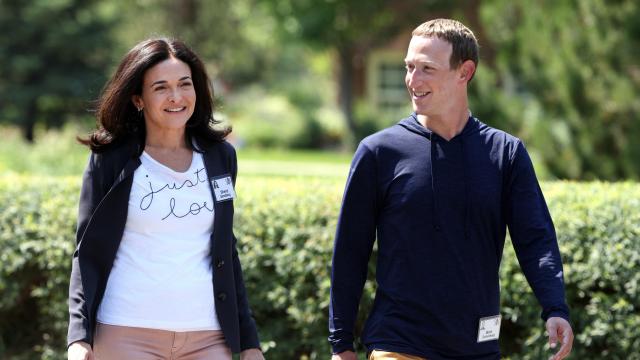A hulking lawsuit made public this week accuses Facebook’s board of agreeing to overpay the Federal Trade Commission billions of dollars in exchange for not personally suing CEO Mark Zuckerberg over the 2018 Cambridge Analytica data leak scandal.
The consolidated lawsuit, made up of multiple complaints filed by Facebook shareholders, was made public on Tuesday, courtesy of Jason Kint, CEO of Digital Content Next, a trade association that represents roughly 80 publishers, including the New York Times and Wall Street Journal. On Twitter, Kint dubbed this the “mother of all lawsuits.”
The plaintiffs in the suits, which were filed publicly in the Delaware Court of Chancery in August, are Facebook shareholders, including pension funds for teachers, firefighters, police, nurses, judges, as well as a construction workers’ union. They accuse Zuckerberg, Facebook COO Sheryl Sandberg, and Facebook board members Marc Andreessen and Peter Thiel of counts related to breach of fiduciary duty. They also accuse Thiel’s data analytics firm, Palantir Technologies, of unfair competition. (Disclosure: Theil secretly funded a lawsuit that bankrupted Gizmodo’s former parent company, Gawker Media.)
“… Zuckerberg, Sandberg, and other Facebook directors agreed to authorise a multi-billion settlement with the FTC as an express quid pro quo to protect Zuckerberg from being named in the FTC’s complaint, made subject to personal liability, or even required to sit for a deposition,” reads the complaint filed by Rhode Island’s pension fund, which has since been consolidated with two other shareholder complaints. They specifically accuse the company of overpaying by agreeing to settle for $US4.9 ($7) billion more than Facebook’s maximum penalty, were the case to go through legal proceedings (which could leave Facebook vulnerable to discovery and a guilty plea).
The FTC has not publicly disclosed its alleged intention to sue Zuckerberg personally. The agency did not yet respond to a request for comment.
The suit draws from documents related to the FTC settlement, which a judge ordered Facebook to turn over to Rhode Island’s pension fund earlier this year. While most of the information they obtained is under seal and redacted, and much has been previously reported, it partly confirms some long-held suspicion about the settlement.
“There were rumours about the amount [of the FTC settlement],” Kint told Gizmodo over the phone.
Kint had wanted more detailed answers about who at Facebook knew what, and when, about the Cambridge Analytica leak, in which the data of some 50 million Facebook users landed in the hands of the political consultancy through improper means. But when the news of the $US5 ($7) billion FTC settlement and a little-discussed $US100 ($138) million SEC settlement arrived simultaneously, he’d worried that he’d never get answers. Prior to the settlement, Kint testified before 14 nations’ parliaments at the International Grand Committee hearing on Big Data, Privacy and Democracy in 2019, stating that despite Facebook’s habitual apologies, “the company has repeatedly refused to have its CEO offer evidence to pressing international governments wanting to ask smart questions, leaving lawmakers with many unanswered questions.”
“[The SEC settlement] was kind of done through a press release at the same time that the five billion dollar lawsuit happened,” Kint said. “Why that amount of money? That’s a huge number without any changes in leadership.”

After the FTC investigated Facebook over Cambridge Analytica, the complaint reads, board minutes show that Facebook refused to settle unless the FTC let Zuckerberg personally off the hook. The record 2019 fine eventually amounted to $US5 ($7) billion, which, the complaint implies, could have been Zuckerberg’s insurance money:
…Zuckerberg, Sandberg, and other Facebook directors agreed to authorise a multi-billion settlement with the FTC as an express quid pro quo to protect Zuckerberg from being named in the FTC’s complaint, made subject to personal liability, or even required to sit for a deposition.
On July 24, 2019, the SEC and Facebook announced a settlement in which Facebook would pay $US100 ($138) million to resolve an investigation into its misleading statements about the Cambridge Analytica breach. That same day, the FTC announced that Facebook had agreed to pay a record-setting $US5 ($7) billion as part of a settlement that included sweeping releases for Zuckerberg and Sandberg (who were not named as defendants).
It’s unclear how a hypothetical negotiation would have gone. But after a lengthy blacked-out section, the complaint continues:
This was the key moment in the negotiations where FTC staff accepted the quid pro quo that Facebook offered: it would allow Zuckerberg to escape but only if Facebook paid billions more than its maximum statutory exposure.
The settlement was the largest in FTC history. Despite that, it still fell far short of a meaningful punishment for a company that made three times that amount in the first quarter of that year alone. After the FTC announced the settlement, congressional Democrats condemned the decision to not hold Zuckerberg personally accountable.
Facebook did not respond to Gizmodo’s request for comment.
The suit, which details Facebook’s alleged imbroglios and cover-ups in stunning detail and length, largely rehashes publicly reported information. It accuses, for example, Zuckerberg and others of ignoring obligations to shareholders by flouting responsibility over data and privacy and incurring “immense reputational harm” that’s hurt its market cap. It starts with a 2012 agreement Facebook made with the FTC to be transparent about sharing data with third parties. Two years later, it notes, Facebook turned around and structured its business around surreptitious third-party access to troves of user data, leading to the Cambridge Analytica scandal.
The New York Times reported in March 2018 that at least one employee at Thiel’s company Palantir helped parse the data and that Zuckerberg didn’t make sure that Cambridge Analytica deleted the data. From the complaint:
Zuckerberg and Sandberg also allowed Facebook’s media relations staff to mislead journalists by claiming, falsely, that Facebook was investigating Cambridge Analytica’s use of Facebook user data and had discovered no evidence of wrongdoing. Finally, Zuckerberg and Sandberg both signed false and misleading SEC filings in which Facebook falsely told investors that “our users’ data may [emphasis theirs] be improperly accessed, used or disclosed” without disclosing that this risk was not hypothetical but, in fact, had already materialised.
Previous internal communications released by the Washington, DC, Attorney General’s Office revealed that Zuckerberg was made aware of the Cambridge Analytica leak as far back as 2015. Facebook employees asked that the company help them investigate the “sketchy” company. The complaint continues:
By December 2015, Facebook also became aware that Cambridge Analytica was using private Facebook data to help Senator Ted Cruz’s campaign.
Rather than taking action to verify that Kogan and Cambridge Analytica had destroyed the data, Facebook merely requested that they delete the personal user information Facebook allowed to be disclosed.
The suit also says that only 0.31% of users gave permission for third parties to share data provided to Cambridge Analytica. The data was originally collected through a personality quiz on Facebook built by psychologist Aleksandr Kogan.
The suit then goes on to detail questionable board dealings — quoting Sheryl Sandberg, who reportedly berated Facebook’s former chief security officer, Alex Stamos, for throwing them “under the bus!” by presenting his findings on Russian interference to the board.
It accuses Zuckerberg and Thiel of a mutually beneficial arrangement that’s made Thiel buckets of money and helped Facebook grab more power. When Facebook launched its stumbling stablecoin, Libra, in June 2019, it drew in Stripe and Spotify (two major Thiel investments), and, the complaint says, allowed Thiel to “expand his cryptocurrency holdings by leading the $US18 ($25) million Series A and $US30 ($41) million Series B funding for the Bitcoin lender, BlockFi.” As payback, it claims, Thiel, an adviser to former President Donald Trump, helped Zuckerberg cosy up to the Trump administration. Thiel, it says, shaped Facebook’s policies “in a manner favourable to the Trump administration to help curry favour with that administration.”
Editor’s Note: Release dates within this article are based in the U.S., but will be updated with local Australian dates as soon as we know more.
